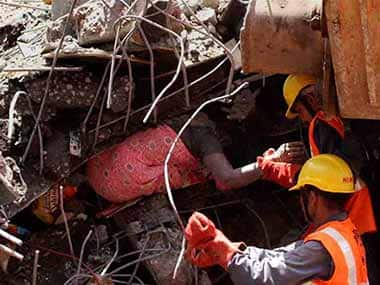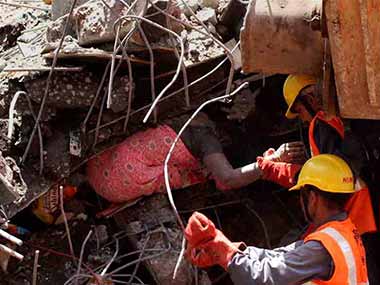When Charles Lindbergh took his solo flight on the Spirit of St. Louisacross the Atlantic in 1927, it caused elation at how humans can push for civilizational changes. An apocryphal story that emerged later spoke of how on hearing of it, a secretary to a major US corporate honcho breathlessly rushed into his office and announced it. Without batting an eyelid, the boss said, “It is no news. Tell me when a committee crosses the Atlantic”. The moral of this apocryphal story is that individuals can and will perform feats, but committees cannot, snared as they are in their procedures and egos. This story came to mind when the Thane Police Commissioner KP Raghuvanshi held a press conference and announced that “bribes were paid” by the builders of the collapsed building in Lucky Compound in Thane’s suburb of Mumbra. It was hardly a big deal given hardly a single building is built without paying bribes. [caption id=“attachment_690292” align=“alignleft” width=“380”]
 The site of the building collapse in Thane suburb Mumbra. PTI[/caption] Civic officials, especially those in departments related to aspects of construction and the town planning process, do take bribes. Ask a builder and he is likely to concede that there are few exceptions to bribe-taking, and among builders, few exceptions to bribe-giving tradition. So this ‘breaking news’ of bribes having been paid is actually no news. Raghuvanshi could have saved his breath. Just because bribe-takers are not reported, and bribe-givers consider it an unavoidable business expense that works a good oil to grease the official machinery, one does not get to hear about the actual give and take. What is given and taken is mind-boggling, and is definitely not petty cash. I have heard builders speak of how about a third of the project cost accounts for bribes at various levels, to the extent it has become what in laid back Hyderabad would be called mamool – routine, the ordinary – or in more honourable language baksheesh, an acknowledgement for the legitimate work done. It may be expression of satisfaction, but is a bribe, regardless of what one calls it. This means that the cost of the apartment for buyers is one third more than what it would have been had the bribes not been given. But since a hungry market of buyers do buy, notwithstanding the occasional sluggishness, downturns and ‘no sale’ periods, the builders have no issues adding their business expense to the price of the flat. Civic officials have an active network which keeps them informed of what is actually happening in their jurisdictions and no major activity can escape their attention. Even in an area known for illegal constructions, a 7-storey building coming up at breakneck speed was bound to be known and a pound of flesh is likely to have been sought. Having paid the money, and since that permits a certain degree of cosiness, corners are cut. The builder community have attempted, with a great degree of success, to transgress the building codes. Axiomatically, the transgressions, higher the profits. And the wrongdoings are not minor. Here are some of them: - Adding floors beyond permissible limits. The civic official moves in only after a building has been built to a certain level where demolition would amount to a substantial financial set back and then stops the work. It results in the heat being turned on the builder, it chafes the buyers who have booked apartments, the builder fears loss of reputation over timely delivery and cuts a deal. Often, an additional floor for which a penalty is paid and regularised, makes civic officials drool. They allow some more excess square feet to be built and ask for a share in the illegitimate profits. Here, it is no more the sweetener, but a proportion of potential profit. - Another violation is not adhering to the approved plans. Under the Urban Land Ceiling laws, approved plans call for smaller apartments for the economically weaker sections, but they are aren’t adhered to. The brochures that buyers are handed out actually show what is to be sold. The sanctioned plan and the apartment finally bought are often as different as chalk and cheese. - Rules require the civic officials to inspect foundations of upcoming building. By and large, they don’t. They prefer to go by the word of the builder. They are to inspect the site after the plinth has been built, which indicates if the construction’s footprint is in accordance with the approved plan. They are also to visit the sites after concrete has been poured for each floor. - When the building is ready, nominal inspections are carried out for the no-objection certificates (NOCs) for the Occupation Certificates (OCs), though many a builder leaves much before that stage. In Thane, 80 per cent of buildings are without these mandatory OCs and occupants pay higher tariffs for water and as property tax. As of last year, 6,000 buildings were without OCs, but were occupied in Mumbai. - Even the civic corporator is part of the game – for a price, he may not raise a shindig about a illegality in the general body meetings. It pays to keep him or her in the good books. It is due to these factors that it comes as no surprise that with the payment of a bribe a shoddily constructed building was allowed to come up till it became a pancake. Who cares, as long as bribes are floating?
The site of the building collapse in Thane suburb Mumbra. PTI[/caption] Civic officials, especially those in departments related to aspects of construction and the town planning process, do take bribes. Ask a builder and he is likely to concede that there are few exceptions to bribe-taking, and among builders, few exceptions to bribe-giving tradition. So this ‘breaking news’ of bribes having been paid is actually no news. Raghuvanshi could have saved his breath. Just because bribe-takers are not reported, and bribe-givers consider it an unavoidable business expense that works a good oil to grease the official machinery, one does not get to hear about the actual give and take. What is given and taken is mind-boggling, and is definitely not petty cash. I have heard builders speak of how about a third of the project cost accounts for bribes at various levels, to the extent it has become what in laid back Hyderabad would be called mamool – routine, the ordinary – or in more honourable language baksheesh, an acknowledgement for the legitimate work done. It may be expression of satisfaction, but is a bribe, regardless of what one calls it. This means that the cost of the apartment for buyers is one third more than what it would have been had the bribes not been given. But since a hungry market of buyers do buy, notwithstanding the occasional sluggishness, downturns and ‘no sale’ periods, the builders have no issues adding their business expense to the price of the flat. Civic officials have an active network which keeps them informed of what is actually happening in their jurisdictions and no major activity can escape their attention. Even in an area known for illegal constructions, a 7-storey building coming up at breakneck speed was bound to be known and a pound of flesh is likely to have been sought. Having paid the money, and since that permits a certain degree of cosiness, corners are cut. The builder community have attempted, with a great degree of success, to transgress the building codes. Axiomatically, the transgressions, higher the profits. And the wrongdoings are not minor. Here are some of them: - Adding floors beyond permissible limits. The civic official moves in only after a building has been built to a certain level where demolition would amount to a substantial financial set back and then stops the work. It results in the heat being turned on the builder, it chafes the buyers who have booked apartments, the builder fears loss of reputation over timely delivery and cuts a deal. Often, an additional floor for which a penalty is paid and regularised, makes civic officials drool. They allow some more excess square feet to be built and ask for a share in the illegitimate profits. Here, it is no more the sweetener, but a proportion of potential profit. - Another violation is not adhering to the approved plans. Under the Urban Land Ceiling laws, approved plans call for smaller apartments for the economically weaker sections, but they are aren’t adhered to. The brochures that buyers are handed out actually show what is to be sold. The sanctioned plan and the apartment finally bought are often as different as chalk and cheese. - Rules require the civic officials to inspect foundations of upcoming building. By and large, they don’t. They prefer to go by the word of the builder. They are to inspect the site after the plinth has been built, which indicates if the construction’s footprint is in accordance with the approved plan. They are also to visit the sites after concrete has been poured for each floor. - When the building is ready, nominal inspections are carried out for the no-objection certificates (NOCs) for the Occupation Certificates (OCs), though many a builder leaves much before that stage. In Thane, 80 per cent of buildings are without these mandatory OCs and occupants pay higher tariffs for water and as property tax. As of last year, 6,000 buildings were without OCs, but were occupied in Mumbai. - Even the civic corporator is part of the game – for a price, he may not raise a shindig about a illegality in the general body meetings. It pays to keep him or her in the good books. It is due to these factors that it comes as no surprise that with the payment of a bribe a shoddily constructed building was allowed to come up till it became a pancake. Who cares, as long as bribes are floating?
Mahesh Vijapurkar likes to take a worm’s eye-view of issues – that is, from the common man’s perspective. He was a journalist with The Indian Express and then The Hindu and now potters around with human development and urban issues.
)